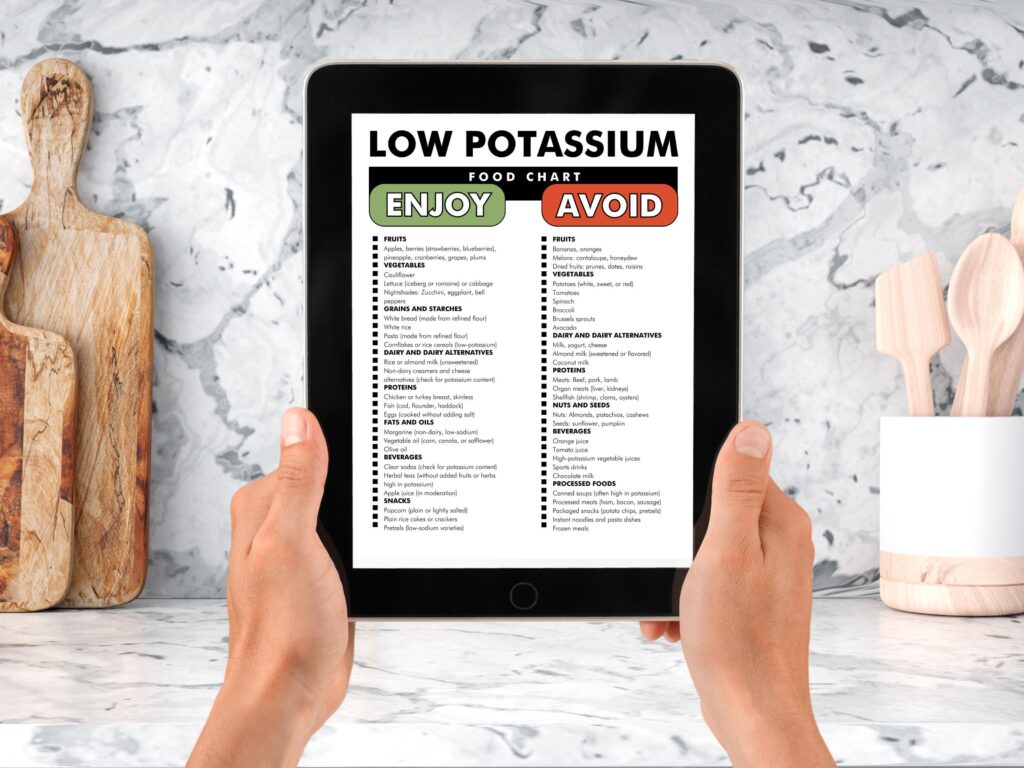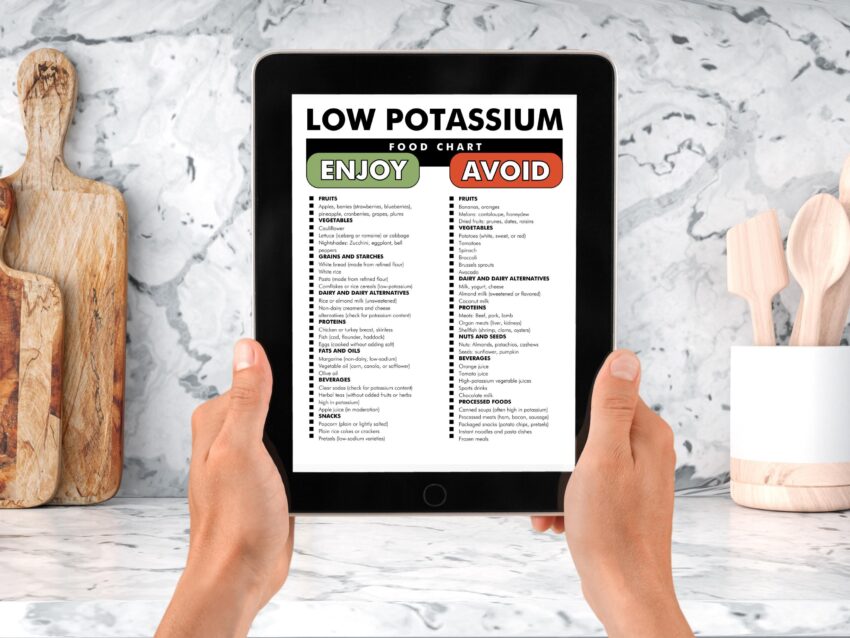
Delicious and Nutritious: Low Potassium Breakfast Foods to Start Your Day Right
Starting your day with a healthy breakfast is crucial, but for individuals managing their potassium intake, finding suitable options can be a challenge. High potassium levels, or hyperkalemia, can be a concern for those with kidney disease or other health conditions. Fortunately, there are plenty of delicious and nutritious low potassium breakfast foods that can help you maintain a balanced diet without sacrificing flavor. This article will explore a variety of low potassium breakfast foods, providing you with options to create enjoyable and healthy morning meals. We’ll delve into specific food choices, preparation tips, and meal ideas, ensuring you have the knowledge to make informed dietary decisions. Remember to always consult with your healthcare provider or a registered dietitian for personalized dietary advice.
Understanding Potassium and Its Importance
Potassium is an essential mineral that plays a vital role in maintaining various bodily functions. It helps regulate blood pressure, supports muscle contractions, and ensures proper nerve function. While potassium is crucial for overall health, individuals with certain medical conditions, such as chronic kidney disease (CKD), may need to limit their intake. When the kidneys aren’t functioning properly, they may not be able to effectively remove excess potassium from the blood, leading to hyperkalemia. Symptoms of hyperkalemia can include muscle weakness, fatigue, and in severe cases, heart arrhythmias. Therefore, managing potassium intake through diet is essential for these individuals.
Identifying Low Potassium Foods
Before diving into specific breakfast ideas, it’s important to understand which foods are generally low in potassium. Foods with less than 200mg of potassium per serving are typically considered low potassium options. Some common examples include:
- Apples
- Berries (strawberries, blueberries, raspberries)
- Cranberry juice
- Corn flakes
- Puffed rice cereal
- White bread
- Unsalted rice cakes
- Coffee
- Tea
It’s also important to be mindful of portion sizes. Even foods that are naturally low in potassium can contribute significantly to your daily intake if consumed in large quantities. Always check nutrition labels and be aware of serving sizes.
Delicious Low Potassium Breakfast Ideas
Cereal and Milk
A classic breakfast option, cereal can be a great choice as a low potassium breakfast food. Opt for cereals like corn flakes or puffed rice cereal, as they tend to be lower in potassium than other varieties. Pair your cereal with unsweetened almond milk or rice milk, which are also lower in potassium compared to cow’s milk. Adding a handful of berries, such as strawberries or blueberries, can enhance the flavor and nutritional value of your breakfast. Be mindful of the sugar content in your cereal and choose options with minimal added sugars.
Toast with Jam or Butter
Simple yet satisfying, toast can be a low potassium breakfast food when made with white bread. Whole wheat bread generally has higher potassium content. Spread your toast with a thin layer of butter or a low-potassium jam or jelly. Avoid jams made with high-potassium fruits like bananas or apricots. You can also add a small amount of cream cheese for extra flavor. Remember to check the labels for potassium content, as some spreads may contain hidden sources of potassium.
Fruit Salad
A refreshing and healthy option, a fruit salad made with low potassium breakfast foods can be a great way to start your day. Combine fruits such as apples, berries, grapes, and peaches. Avoid high-potassium fruits like bananas, oranges, and kiwis. To add a bit of sweetness, you can drizzle a small amount of honey or maple syrup over your fruit salad. This breakfast is packed with vitamins, minerals, and antioxidants, making it a nutritious and delicious choice.
Scrambled Egg Whites
While whole eggs contain a moderate amount of potassium, egg whites are significantly lower. Scrambled egg whites can be a good source of protein for your breakfast. You can add some chopped vegetables like bell peppers or onions for added flavor and nutrients. Be mindful of the sodium content and use salt sparingly. Cooking your egg whites in a non-stick pan can help reduce the need for oil or butter, further minimizing the fat content of your breakfast.
Oatmeal Alternatives
Traditional oatmeal can be relatively high in potassium, but there are alternatives you can consider. Cream of Wheat, when prepared with water or almond milk, is a lower potassium option. You can also try Cream of Rice cereal. Top these cereals with low-potassium fruits like berries or a sprinkle of cinnamon for added flavor. Avoid adding high-potassium ingredients like raisins or bananas.
Tips for Preparing Low Potassium Breakfasts
- Read Labels Carefully: Always check the nutrition labels of all ingredients to determine their potassium content.
- Portion Control: Even low-potassium foods can contribute significantly to your daily intake if consumed in large quantities. Be mindful of serving sizes.
- Choose Low-Potassium Alternatives: Opt for low-potassium milk alternatives like almond milk or rice milk.
- Avoid High-Potassium Additions: Be cautious of adding high-potassium ingredients like bananas, avocados, or spinach to your breakfast.
- Prepare Foods Properly: Some cooking methods, such as boiling vegetables, can help reduce their potassium content. However, this is more applicable to vegetables than typical breakfast items.
- Consult a Professional: Work with a registered dietitian or healthcare provider to develop a personalized meal plan that meets your specific needs and dietary restrictions.
Sample Low Potassium Breakfast Meal Plan
Here’s a sample meal plan to give you an idea of how to incorporate low potassium breakfast foods into your daily routine:
Day 1: Corn flakes with unsweetened almond milk and a handful of blueberries.
Day 2: White toast with low-potassium jam and a cup of black coffee.
Day 3: Fruit salad with apples, grapes, and strawberries.
Day 4: Scrambled egg whites with chopped bell peppers and a side of white toast.
Day 5: Cream of Wheat prepared with water and topped with a sprinkle of cinnamon.
Day 6: Rice cakes topped with a thin layer of cream cheese and sliced strawberries.
Day 7: A small apple with a cup of herbal tea.
The Importance of a Balanced Diet
While managing potassium intake is crucial for certain individuals, it’s equally important to maintain a balanced diet overall. Ensure you are getting adequate amounts of other essential nutrients, such as protein, carbohydrates, and healthy fats. A registered dietitian can help you create a comprehensive meal plan that meets your specific nutritional needs while adhering to your potassium restrictions. Remember that dietary needs can vary significantly from person to person, so personalized guidance is always recommended.
Staying Hydrated
Staying properly hydrated is also an important aspect of managing potassium levels. Drinking plenty of water throughout the day can help your kidneys function more effectively and remove excess potassium from your body. Aim for at least eight glasses of water per day, unless otherwise instructed by your healthcare provider. Avoid sugary drinks and excessive caffeine consumption, as these can have adverse effects on your health.
Conclusion
Managing your potassium intake doesn’t mean you have to sacrifice a delicious and nutritious breakfast. By choosing the right low potassium breakfast foods and being mindful of portion sizes, you can enjoy a variety of tasty meals while maintaining a balanced diet. Remember to read labels carefully, consult with a healthcare professional, and prioritize a balanced approach to nutrition. With the right knowledge and planning, you can start your day off right with a healthy and satisfying breakfast that supports your overall well-being. The key is to be informed, proactive, and adaptable to your individual needs. By incorporating these low potassium breakfast foods into your diet, you can take control of your health and enjoy a fulfilling and delicious breakfast every morning. [See also: Understanding Potassium Levels] Remember to always consult with your doctor or a registered dietitian before making significant changes to your diet, especially if you have underlying health conditions.
